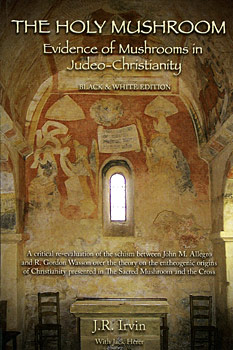
[an error occurred while processing this directive]
Jan Irvin (The Holy Mushroom) has captured what we might call an anthropology of clarification regarding whether or not mushrooms, and mind-altering substances in general, played any role in the development of not only Judaism and Christianity but the total culture in play at that time. It is now recognized in many academic communities (anthropologists,sociologists, psychiatrists, psychologists) that sufficient evidence exists of the importance of these substances, both textual and visual, to say yes in very large letters. It is no longer theory. The questions Irvin asks is this: If mind-altering substances did play this major role, then how would this affect our interpretations of the Bible and the Quran? Would this shed light on the origins of mystical experiences and the stories, for example Abraham hearing voices and Ezekiels convenient visions? What would this suggest about the shamanic behavior of Jesus? What impact would this have on organized religion? These are bold questions. This is a very useful volume for those interested in the Holy Mushroom and the politics of truth. Detailed and wonderfully illustrated; great bibliography."
-- Professor John A. Rush, Sierra College
"John Allegro's revelation of the sacramental role of a sacred mushroom in the ancient religions spanning the agrarian region from Mesopotamia to the Near East was immediately and unfairly rejected by a chorus of scholars less competent than him, but continuing research into early Christianity and the mystery religions of the Greco-Roman world and their perpetuation in alchemy and European folkloric traditions has vindicated the correctness of his discovery."
-- Professor Carl A. P. Ruck, Boston University
"Jan Irvin has produced a most thoughtful and valuable account of debate around the use of hallucinogenic mushrooms in early Christianity. Irvin's careful account of the main protagonists, their sources and intellectual motivations shows the importance of continuing research on this significant moment in early Christian thought, as well as how academic research itself is affected by the cultural attitudes of the day. In adducing new textual evidence and showing the iconographic prevalence of the mushroom motif Jan Irvin is to be warmly congratulated - all serious scholarship for the future will have to take account of his achievement."
-- Professor Neil Whitehead, University of Wisconsin, Madison
BLURBS #
"Christianity and the Piltdown Hoax (one of the largest academic scandals in history) share many similarities: In both stories the information was constructed and then salted into the information stream, and, through the word of noted scholars, presented as fact, the truth. Scholars have egos and once committed to their ideas through scholarly publications, faculty meetings, and conferences, have difficulty seeing, hearing, or even appreciating an adverse view. To waver from a strongly held opinion could spell academic ruin and withdrawal of acclaim. This leads to lively debate,counter stories, and even character assassination if one side or the other is being out trumped in the symbolic mêlée. Jan Irvin (The Holy Mushroom) has captured what we might call an anthropology of clarification regarding whether or not mushrooms, and mind-altering substances in general, played any role in the development of not only Judaism and Christianity but the total culture in play at that time. It is now recognized in many academic communities (anthropologists,sociologists, psychiatrists, psychologists) that sufficient evidence exists of the importance of these substances, both textual and visual, to say yes in very large letters. It is no longer theory. The questions Irvin asks is this: If mind-altering substances did play this major role, then how would this affect our interpretations of the Bible and the Quran? Would this shed light on the origins of mystical experiences and the stories, for example Abraham hearing voices and Ezekiels convenient visions? What would this suggest about the shamanic behavior of Jesus? What impact would this have on organized religion? These are bold questions. This is a very useful volume for those interested in the Holy Mushroom and the politics of truth. Detailed and wonderfully illustrated; great bibliography."
-- Professor John A. Rush, Sierra College
"John Allegro's revelation of the sacramental role of a sacred mushroom in the ancient religions spanning the agrarian region from Mesopotamia to the Near East was immediately and unfairly rejected by a chorus of scholars less competent than him, but continuing research into early Christianity and the mystery religions of the Greco-Roman world and their perpetuation in alchemy and European folkloric traditions has vindicated the correctness of his discovery."
-- Professor Carl A. P. Ruck, Boston University
"Jan Irvin has produced a most thoughtful and valuable account of debate around the use of hallucinogenic mushrooms in early Christianity. Irvin's careful account of the main protagonists, their sources and intellectual motivations shows the importance of continuing research on this significant moment in early Christian thought, as well as how academic research itself is affected by the cultural attitudes of the day. In adducing new textual evidence and showing the iconographic prevalence of the mushroom motif Jan Irvin is to be warmly congratulated - all serious scholarship for the future will have to take account of his achievement."
-- Professor Neil Whitehead, University of Wisconsin, Madison

